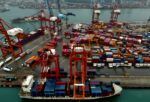Saudi Aramco says half-year net income slips to $46.9 bn
Saudi Arabia is the world’s top oil exporter (MARWAN NAAMANI)
Riyadh (AFP) – Saudi energy giant Aramco said Monday its first half net income for 2019 slipped nearly 12 percent to $46.9 billion, a first such disclosure that still reinforces its position as the world’s most profitable company.
The revenue drop — on lower crude prices — was reported as speculation swirled that the state-owned company was stepping up preparations for its much-delayed overseas stock listing, dubbed potentially the world’s biggest.
The news also coincided with an announcement by India’s Reliance that it had agreed to sell a 20-percent stake in its oil and chemicals business — worth $15 billion — to Aramco.
Hosting its first-ever earnings call as the secretive company seeks to boost transparency, Aramco said the deal was at a “very early stage”.
Reporting its revenue, Aramco said: “The company’s net income was $46.9 billion for the first half (of) 2019, compared to $53.0 billion for the same period last year.”
It is the first time the company has published half-year financial results and comes after Aramco opened its secretive accounts for the first time in April as it prepares to raise funds from investors.
“Despite lower oil prices during the first half of 2019, we continued to deliver solid earnings and strong free cash flow underpinned by our consistent operational performance, cost management and fiscal discipline,” Aramco CEO Amin Nasser was quoted as saying in a company statement.
Analysts say record demand for a $12-billion debut international bond launched this year has propelled the world’s top oil exporter to speed up efforts to float the company.
But in its earnings call, the company gave no timeframe for the planned initial public offering.
Crown Prince Mohammed bin Salman has previously said the IPO — which could potentially be the world’s biggest stock sale — would take place in late 2020 or early 2021.
– ‘Generate buzz’ –
Saudi Arabia plans to sell up to five percent of the world’s largest energy firm and hopes to raise up to $100 billion based on a $2 trillion valuation of the company.
But investors have long debated whether Aramco was really valued so much.
Failure to reach a $2 trillion valuation as desired by Saudi rulers is widely considered the reason the IPO — earlier scheduled for 2018 — has been delayed.
The preliminary deal with Reliance, which the Indian giant hailed as the “biggest foreign investment” in its history, underscores Aramco’s efforts to diversify its operations and boost its valuation.
“(There is) an effort to generate buzz about the company’s success and potential valuation,” Ellen Wald, author of the book “Saudi Inc.”, told AFP.
“But ultimately the valuation of the company is not determined by the king, the prince or the CEO. It’s determined by the banks and the markets.”
The planned IPO forms the cornerstone of a reform programme envisaged by Prince Mohammed to wean the Saudi economy off its reliance on oil.
Saudi Arabia has not announced where the listing will be held, but London, New York and Hong Kong have all vied for a slice of the much-touted IPO.
– World’s biggest profit –
The petro-state has taken a number of key procedures in preparation for the IPO, including issuing a law for hydrocarbons tax, appointing a new board for Aramco and allowing an independent auditing of the kingdom’s oil reserves, the crown prince said in June.
Aramco has also opened its accounts books for the first time to international ratings agencies, declared the size of its profits and transformed into a public shareholding company, he added.
In April, Aramco revealed it made the world’s biggest corporate profit last year.
Aramco posted a net profit of $111 billion in 2018 — far higher than the combined net earnings of the five international oil majors — and generated $356 billion in revenues.
Aramco also dethroned Apple as the world’s most profitable firm. Last year, the US tech giant posted nearly $50 billion in net profits.
Disclaimer: Validity of the above story is for 7 Days from original date of publishing. Source: AFP.


